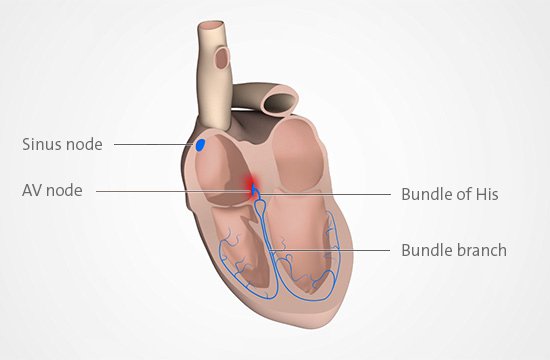American College of Cardiology (ACC), American Heart Association Task Force on Clinical Practice Guidelines (AHA), Heart Rhythm Society (HRS). ACC/AHA/HRS Guideline on the Evaluation and Management of Patients with Bradycardia and Cardiac Conduction Delay. 2018.
Deutsche Gesellschaft für Kardiologie (DGK). Pocket-Leitlinie: Schrittmacher- und kardiale Resynchronisationstherapie. 2021.
Deutsche Gesellschaft für Kardiologie (DGK). Schrittmacher- und Defibrillator-Träger sollten einen Sicherheitsabstand zu ihrem Smartphone einhalten. 2015.
Deutsche Gesetzliche Unfallversicherung (DGUV). Beeinflussung von Implantaten durch elektromagnetische Felder. Eine Handlungshilfe für die betriebliche Praxis. 2012.
Glikson M, Nielsen JC, Kronborg MB et al. 2021 ESC Guidelines on cardiac pacing and cardiac resynchronization therapy. Europace 2022; 24(1): 71-164.
Kasper DL, Fauci AS, Hauser SL et al. Harrison's Principles of Internal Medicine. New York: McGraw-Hill; 2015.
Kindermann M, Fröhlig G. Körperliche Aktivität und Sport bei Schrittmacherpatienten. Dtsch Arztebl 2004; 101(47): A 3191-3197.
Klein HH, Sechtem U, Trappe HJ et al. Pocket-Leitlinie: Fahreignung bei kardiovaskulären Erkrankungen. 2018.
Malm D, Hallberg LR. Patients' experiences of daily living with a pacemaker: a grounded theory study. J Health Psychol 2006; 11(5): 787-798.
Munawar DA, Chan JE, Emami M et al. Magnetic resonance imaging in non-conditional pacemakers and implantable cardioverter-defibrillators: a systematic review and meta-analysis. Europace 2020; 22(2): 288-298.
Napp A, Kolb C, Lennerz C et al. Elektromagnetische Interferenz von aktiven Herzrhythmusimplantaten im Alltag und im beruflichen Umfeld. Stellungnahme der Deutschen Gesellschaft für Kardiologie (DGK) und der Deutschen Gesellschaft für Arbeitsmedizin und Umweltmedizin (DGAUM). Kardiologe 2019; 13: 216-235.
Sommer T, Bauer W, Fischbach K et al. MR-Untersuchungen bei Patienten mit Herzschrittmachern und implantierbaren Kardioverter-Defibrillatoren. Konsensuspapier der Deutschen Gesellschaft für Kardiologie (DGK) und der Deutschen Röntgengesellschaft (DRG). Kardiologe 2017; 11: 97-113.
Von Knobelsdorff-Brenkenhoff F, Bauer WR, Deneke T et al. Empfehlungen zu kardialen MRT-Untersuchungen bei Patienten mit Herzschrittmachern und implantierbaren Kardioverter-Defibrillatoren. Kardiologe 2019; 13(2): 75-86.
IQWiG health information is written with the aim of helping people understand the advantages and disadvantages of the main treatment options and health care services.
Because IQWiG is a German institute, some of the information provided here is specific to the German health care system. The suitability of any of the described options in an individual case can be determined by talking to a doctor. informedhealth.org can provide support for talks with doctors and other medical professionals, but cannot replace them. We do not offer individual consultations.
Our information is based on the results of good-quality studies. It is written by a team of health care professionals, scientists and editors, and reviewed by external experts. You can find a detailed description of how our health information is produced and updated in our methods.


